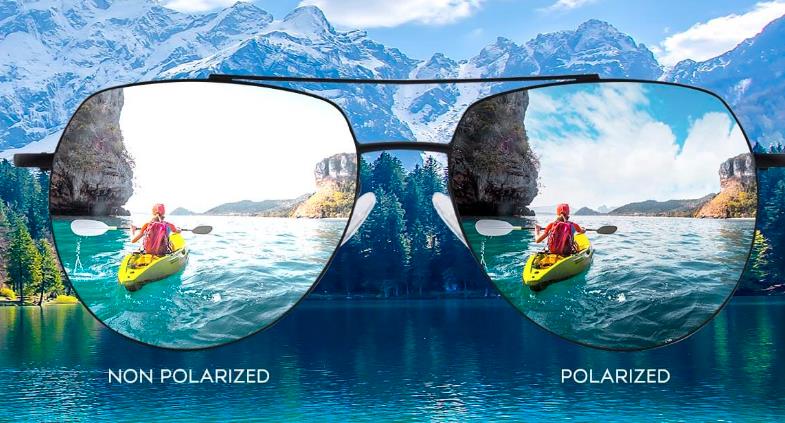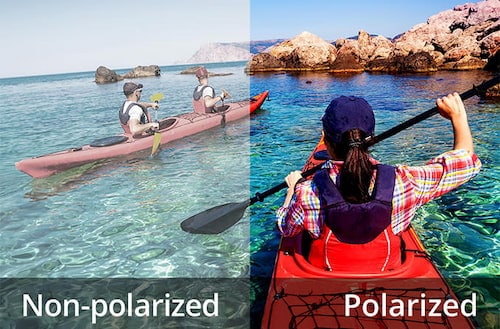What Are Polarized Sunglasses? Everything You Should Know
Sep 19 2022
Do you ever find yourself trying on new sunglasses only to be disappointed? You put them on and step out into the sunlight only to find that they don't provide the relief you were looking for. Whether you're trying to enjoy a day at the beach or simply driving to work, you always have to deal with glare, which can be a real pain.
In this case, you may need a pair of polarized sunglasses, which can help you solve these issues. Now we will discuss what are polarized sunglasses and everything you should know about them.
Keep reading!

What Does It Mean When Sunglasses Are Polarized?
When most people think of sunglasses, they think of the large, dark lenses that are meant to protect their eyes from the sun's harmful rays. However, there is another type of sunglasses that have become increasingly popular in recent years – polarized sunglasses.
The polarized lenses are made with a special process to filter out intense glare for your comfort while still allowing only some light through, making them ideal for activities such as driving or fishing. But how do they work?
Polarized sunglasses work by using a thin film that is coated with a special material that absorbs horizontal light waves. This means that when light hits the lens, only vertical light waves are able to pass through. This eliminates glare and makes it easier to see in bright conditions.
If you're looking for a pair of sunglasses that will help you see more clearly and reduce eye fatigue, then polarized sunglasses may be right for you.
The Difference Between Polarized and Non-polarized Lenses

The difference between polarized and non-polarized sunglasses is significant, though they are both used to protect eyes from the sun.
• Polarized sunglasses are good for reducing glare than non-polarized lenses. This makes them ideal for use while driving or when participating in outdoor activities. Non-polarized lenses don't have the glare-reducing film, but they do provide UV protection.
• Polarized lenses can make it difficult to read LCD screens, while non-polarized lenses can be used with computers and smartphones without issue.
• Polarized lenses are more expensive than non-polarized lenses.
Pros and Cons of Polarized Sunglasses
Polarized sunglasses have been around for many years and are a popular choice for those who spend time outdoors. Here are some pros and cons of polarized sunglasses to consider before purchasing them.
Pros:
• Best polarized sunglasses reduce glare from the sun, making them ideal for driving, fishing, and other activities where you need to see clearly.
• Polarized lenses can help reduce eye fatigue since you're not squinting as much to block out the sun's glare.
• They can also make images appear sharper and clearer. This makes for a more enjoyable experience with the increased clarity of vision.
Cons:
• They can make it difficult to read your phone or other electronic devices since the screen will appear darker than usual.
• Some people find that polarized lenses make it difficult to distinguish between white colors.
When to Use Polarized Glasses?
Polarized glasses are not a style choice, they are a functional necessity for many outdoor activities. Whether you are driving to work or taking a step off the beaten path on a backpacking adventure, polarized lenses will help reduce glare and protect your eyes from the harmful rays of the sun.
Here are some tips on when to use polarized glasses:
1. When driving: Polarized glasses can reduce the glare from the sun and other cars on the road, making it easier to see.
2. When participating in outdoor activities: Whether you're fishing, hiking, or playing golf, polarized glasses can help reduce glare and improve your visibility.
3. When working or playing in the snow: When the sun's rays reflect off of snow, they can create a blinding glare. Polarized sunglasses are a good choice for snowy conditions because they help to reduce glare.
Additionally, if you already wear glasses for vision correction, you may need to purchase special clip-on or prescription sunglasses from online stores like GlassesShop in order to take advantage of the benefits that polarization has to offer.
Polarized lenses are better for your vision than non-polarized lenses; they provide contrast and minimize eye fatigue. The result is sharper, more defined vision that is easier on the eyes. If you are considering polarized lenses, be sure to talk to an eye care professional from GlassesShop to find out if they are right for you.
FAQs
Are polarized sunglasses really better?
Polarized sunglasses reduce glare by blocking out reflected light. This can be helpful when you’re driving because it makes it easier to see the road. They can also be helpful for people who have light sensitivity or migraines.
Which is better: UV or polarized sunglasses?
UV sunglasses are the most effective at blocking UV rays, but they don’t do anything to reduce glare. Polarized sunglasses, on the other hand, can reduce glare. This makes them a better choice for activities like driving or fishing, where you need to be able to see clearly. However, polarized sunglasses don’t offer the same level of protection from UV rays as UV sunglasses.So which is better? It depends on your needs.
How can I tell if sunglasses are polarized?
If you’re unsure if your sunglasses are polarized, here’s a simple test to check: Look through your lenses at the screen, and rotate your glasses to a 60°angle. If the lenses are polarized, they will turn black.